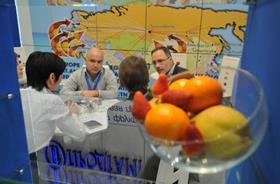
The Russian embargo on fresh fruit and vegetables imported from the EU, US, Australia, Canada and Norway is expected to alter dramaticallythe flow of goods between international markets and, in doing so, create major new challenges for the industry as a whole.
That's according to Messe Berlin, organisers of the industry's leading trade fair Fruit Logistica, which takes place every February in Berlin.
'This [ban] gives rise to risks,' the group said in a statement, 'but at the same time great opportunities for those who are able to open new markets.'
Fruit Logistica's next edition, on4-6 February 2015, therefore takes on an even greater importance in the light of recent developments in Russia.
According to Gérald Lamusse, the event's global brand manager, the Berlin show offers the ideal opportunity to establish new markets and, in doing so, diversify in order to survive the Russian ban.
'We provide a unique forum to open up new sales channels, establish new business contacts and strengthen existing relationships,' he commented, noting that more than 60,000 buyers and suppliers from around the world are due to meet at the upcoming event.
Five months ahead, more stands have already been booked than at the start of Fruit Logistica 2014, suggesting interest in the fair as a central meeting point for the international fruit and vegetable business continues to grow.
'We expect more than 2,600 exhibitors from around the world, who come to Berlin to lay the foundations for business success,' Lamusse added. 'We [view] this strong turnout as a major vote of confidence. This motivates us even more to continue providing an excellent environment for good business.'



